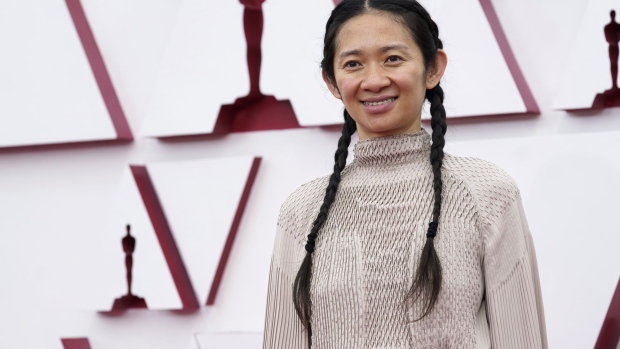Apr 25, 2021
'Nomadland' wins best picture Oscar in a rare victory for Disney
, Bloomberg News

“Nomadland,” a film about a grief-struck woman traveling through the American West, won the Academy Award for best picture, delivering a major victory for Walt Disney Co. and ending an almost 20-year drought for Hollywood’s biggest studio.
Chloe Zhao, who made “Nomadland,” was crowned best director, becoming the first woman of color to win that award and contributing to an Oscars ceremony that was among the most inclusive in the academy’s history. The acting prizes also honored a diverse pool of talent -- including a Black man and an Asian woman -- six years after the #OscarsSoWhite movement used social media to cast a light on bias in Hollywood.
While the broadening pool of winners was welcome, the Oscars faced challenges. The ceremony had to be pared down because of the coronavirus pandemic, which meant fewer than 200 people attended in person at Union Station in Los Angeles. It was delayed by about two months, and there were no blockbusters among the films competing for the top prizes. That suggests Sunday’s broadcast on ABC may be even smaller than last year’s record-low audience.
This year’s ceremony was run without a host. But in opening remarks, actress-director Regina King touched on the losses from the pandemic, while paying tribute to Hollywood’s never-ending ability to entertain and distract.
“Tonight we are here to celebrate,” she said. “This was indeed a hard year for everyone, but our love of movies helped to get us through. It made us feel less isolated and connected us when we were apart.”
Though the past year was mostly marked by the rising popularity of streaming services, with theaters closed through much of 2020, traditional studios still picked up plenty of awards, including five for Disney. Frances McDormand, the star of “Nomadland,” picked up the prize for best actress, while Anthony Hopkins won the best actor award for “The Father,” a Sony film about a man battling dementia.
Emerald Fennell won the best original screenplay award for “Promising Young Woman,” a Universal-Focus Features film about a woman seeking revenge for the rape of her friend. Daniel Kaluuya won best supporting actor for his part in “Judas and the Black Messiah,” about the FBI’s attempts to infiltrate the Black Panthers. The film was distributed by Warner Bros. and debuted at the Sundance Film Festival.
Still, streaming services held their own, with Netflix Inc. grabbing seven awards. For the first time, movies that debuted online were eligible to win Hollywood’s top honor. Netflix, which got a boost during the pandemic lockdown, had the most nominations and two chances to win best picture in “The Trial of the Chicago 7” and “Mank.” It has never won a best picture award, despite repeated nominations.
The streaming company did win for best documentary feature, picking up the award for the film “My Octopus Teacher,” and took home the prize for best animated short for “If Anything Happens I Love You.” It also won two prizes for “Mank,” including best production design and best cinematography.
Disney has recently posed more of a challenge to Netflix, drawing in tens of millions of new users to Disney+, and the best picture award may give it another bump. The studio picked up “Nomadland” from Searchlight Pictures as part of its acquisition of 20th Century Fox. It last won best picture in 2003, when the musical “Chicago” won the prize.
ABC, another Disney unit, won the night in a different way, by selling out ads for the evening’s ceremony. Despite weak viewership projections, a single ad went for about $2 million, one of the most expensive slots in TV. The network promoted the show heavily in a bid to narrow the viewer losses from last year’s record-low audience of about 24 million.







